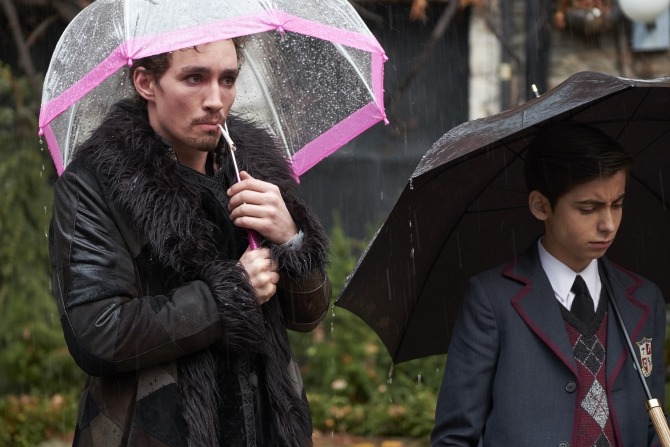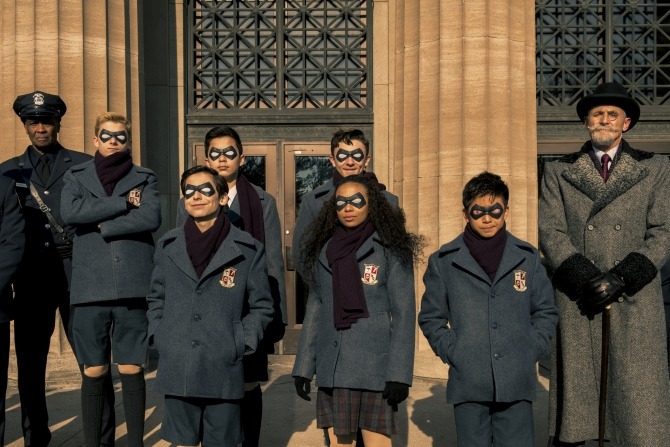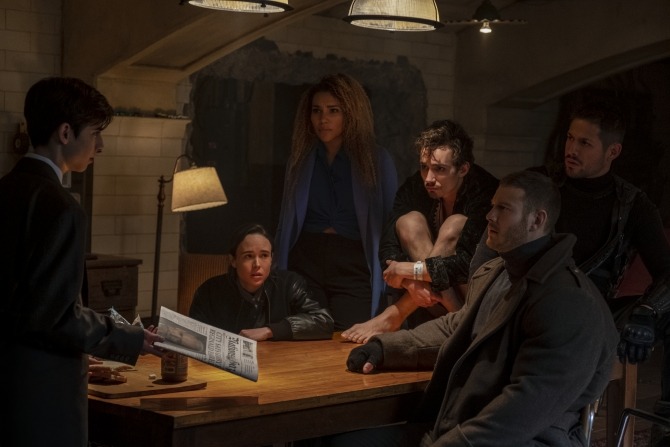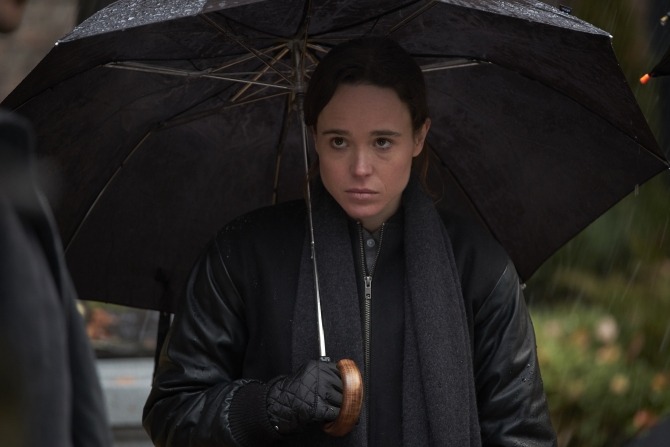
Gerard Way and Gabriel Ba’s The Umbrella Academy, which opens with the spontaneous birth of 43 superpowered babies right at the moment a wrestler elbow drops a giant space squid in the ring, might be unadaptable. Despite its best efforts to capture the delightful weirdness of the comic as well as expand on some of the storylines only hinted at in the book, the new Netflix series is ultimately too grounded and sluggish to really keep us invested. The series never quite finds its rhythm until the very end and is surprisingly dull throughout, especially in the first few exposition-heavy episodes.
The Umbrella Academy is the story of the Hargreeves orphans, a super-powered group of kids mysteriously born at the exact same time in different parts of the world, who are trained by their cold and manipulative adoptive father, Sir Reginald Hargreeves, to save the world. Originally a famous superhero team of seven – Luther, Diego, Allison, Klaus, Number Five, Ben, and Vanya – the family slowly begins to decay as the years go by. One sibling dies during a mission while Number Five capriciously travels far into the future against his father’s wishes, never to be seen again. Most of the others eventually pack up and leave the Academy when they’re old enough.
When the series begins, it’s been 12 years since the team was together. But when Sir Reginald suddenly dies – seemingly of natural causes, although Luther (Tom Hopper), the loyal leader of the team, is not so sure – his adult children are forced into a nightmarish family reunion and back into old habits. As you would expect, things do not go well.
It should be said up front that viewers expecting an action-packed superhero romp or something akin to Netflix’s Marvel lineup will be sorely disappointed. The Umbrella Academy is not that kind of show, trading in the action sequences (of which there are very few) for slightly long-winded family drama. Of course, this won’t surprise fans of the Eisner-winning series, itself a deconstruction of iconic superhero teams such as the Fantastic Four, the X-Men, and most importantly, DC’s Doom Patrol, one of the comic’s major influences. While the Netflix series does an admirable job of trying to captivate its audience with this particularly dysfunctional family of super-weirdos, it does so at the expense of its pacing. The Umbrella Academy is incredibly slow.
The show’s biggest problem is that it tries to stretch the book’s six-issue first volume, “Apocalypse Suite,” into ten 50-minute episodes, with bits and pieces of the second arc, “Dallas,” thrown in. It’s clear two or three episodes in that the show doesn’t have enough material to keep things moving to the end, so showrunner Steve Blackman (Altered Carbon) and writer Jeremy Slater (Fantastic Four) crafted new storylines and expanded others while also remixing a few of the comic’s character arcs. Unfortunately, these ‘bonus’ scenes and new subplots rarely work. At times, they’re actually detrimental to the characters.
This is largely the case for protagonist Vanya Hargreeves (Ellen Page), who is inexplicably thrust into an unnecessary romantic subplot. In the comics, Vanya is an outcast, neglected by the emotionally abusive Sir Reginald and sidelined by her narcissistic siblings. When her father dies, she’s lonely and without a support system, harbouring a quiet animosity towards her brothers and sisters, who are too busy dealing with their own drama to notice her. They’ve never let her in, even with her father removed from the equation. So when Vanya makes the choice to leave the family behind and go her own way, it’s not really all that surprising.
The show, on the other hand, puts Vanya in an awkward relationship in order to flesh out another major player from the comics. The problem might be that the show never fully commits to the relationship, spoiling a big twist before we’re ever really even invested in Vanya’s love life. In the end, Vanya’s story feels diluted by the additional subplot.
It’s all in service of getting this show, which could have easily been two or three episodes shorter, to the finish line. Other annoying additions include a murder mystery surrounding Diego (David Castaneda), the family’s robotic caretaker Mom (Jordan Claire Robbins), and their super-intelligent chimpanzee friend Pogo (Adam Godley); and an extended look at time-travelling assassins Cha-Cha (Mary J. Blige) and Hazel (Cameron Britton), who also falls victim to a strange romantic storyline. In the case of the murder mystery, the family members search for Sir Reginald’s missing monocle – which might provide evidence of foul play in connection to his death – but it never really goes anywhere. To make matters worse, the show basically gives up on the yarn in the third act, giving the audience the answer with a few lines of exposition.

Meanwhile, troubled, drug-addicted Klaus (Robert Sheehan) gets much more screentime than comic fans might expect, and Sheehan is excellent in the role as if it were written for him. But too often, perhaps inspired by Sheehan’s outrageous performance as Nathan Young in Misfits, the character is played for laughs. The result is a joke that begins to feel repetitive. Klaus is nowhere near this dim-witted in the comics. One thing that does work in Klaus’ favour is his ability to communicate with the dead, which adds a horror element to the show.
While all that’s going on, knife-wielding Diego, the rogue of the family, also gets a love interest, and it’s by far the least interesting love story of all. Why Blackman and Slater felt that the only way to explore many of these characters was through romance is beyond me. In Way and Ba’s comic, introspection doesn’t come from the romantic, but through the familial ties that bind. For example, in the comic, Diego has to figure out a way to work with Luther, an altruistic hero who is sort of incompetent at being the team’s leader, and while at first Diego despises his brother, they end up growing together. In the third arc of the comic, it’s Diego, a loner by nature, who has to convince a depressed Luther to get the team back together.
It’s clear that everyone involved with this adaptation has real love for the comic, from the way it accurately recreates the young Umbrella Academy’s costumes to the camera angles that recall the work of film auteur Wes Anderson, who is a clear influence on both the book and the show (you could almost imagine this as Anderson’s very own take on the superhero genre, with all of the beautiful shots and retro zaniness). Blackman and his crew really took the time to make the show look and sound great – one particular shot of helicopters flying over Vietnam comes to mind – but it also feels like they don’t fully understand what makes Way and Ba’s fast-paced, minimalist, vignette-heavy family drama so effective.
Despite my complaints about Vanya’s extended storyline, I’m happy to say that Page’s performance as the timid and anxious main character of this family tragedy is top notch. She makes the best of every scene she’s in, even when her romantic counterpart isn’t quite up to the task. Page is subtle in scenes with her over-the-top siblings, layering in claustrophobic loneliness over her deep-seated anger at being the sister everyone always ignores.

Number Five, played by Aidan Gallagher, who’s spent most of his career on Nickelodeon kids shows, is also a highlight. Gallagher is well-cast and is able to convey the wisdom beyond his years necessary for the role of a 60-year-old hitman trapped inside the body of a ten-year-old (although he’s slightly older than that on the show). He rarely cracks a smile as the self-serious Number Five, or partake in his family’s childish shenanigans, but when he does let loose, it’s entertaining and very funny.
This trigger-happy hero-turned-assassin is also one of the few characters who benefit from an expanded storyline. The show dives much deeper into Number Five’s backstory, giving us colourful pieces of his backstory the comic never has. Along the way, we learn much more about the secret organization Number Five worked for before rejoining his family in the present day. His interactions with this faction of time-jumping assassins are among the best in the entire series. Here, the show doesn’t rely on romance to flesh out a character and it’s really refreshing.
Surprisingly, Luther and Allison (Emmy Raver-Lampman) get the least to do. While at the forefront of the comic, Luther takes a backseat to the characters the people behind the show are really enamoured with, like Vanya, Klaus, Number Five, and Diego. On the show, Luther is a bit more bumbling and I had a hard time believing that any of these characters would actually follow him into battle, but there are some high points for him, too. His story is one of self-discovery, as he steps out from under his father’s shadow for the first time (this is a man who’s never had a drink or done a drug or rebelled against his dad), and it’s in Luther’s search for clarity as an independent adult for basically the first time that this character shines.
As the credits roll on an enjoyable final episode, it’s hard to call Netflix’s The Umbrella Academy a success, but like its troubled family of freaks, it’s not a lost cause. There are parts of the series to really like – the latter half of Klaus’ arc when he’s given a bit more depth, a hilarious showdown involving an ice cream truck, and a character’s complete infatuation with the torso of a mannequin – that hint at a freshness that could set it apart from other superhero TV and movies.

The Umbrella Academy is at its strongest when it commits to the weirder elements of its story and world, such as the aforementioned talking chimpanzee, and does itself a disservice by trying to ground its characters in needless romance and the menial. Like Vanya herself, there’s potential here, the show just needs to go off the deep end first.
The Umbrella Academy arrives on Netflix UK on Friday the 15th of February.

